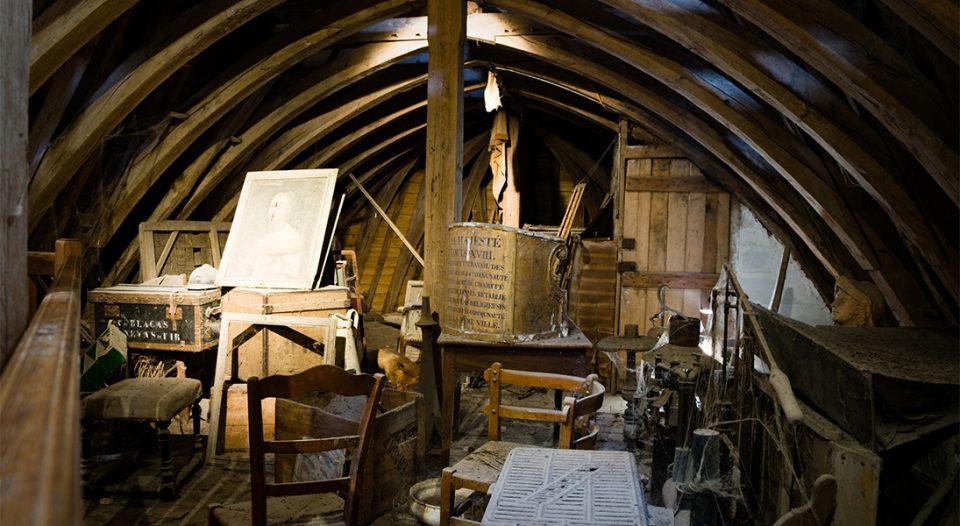Series editor’s note: Throughout 2024 “Deeper understandings” will feature teaching scholars of the ELCA reflecting on the many ways that Lutheran theology makes a difference for our daily lives. —Kristin Johnston Largen, president of Wartburg Theological Seminary, Dubuque, Iowa, on behalf of the ELCA’s seminaries
In 2019 the pop singer Pink gifted the world the song “My Attic.” Its opening lyrics capture a cluster of insights:
My attic is full of pages, full of crazy
Cluttered spaces that you could not cross
My attic is full of bones and full of hopeless
Young emotions that just won’t grow up
I keep hiding the keys in all these
Places even I can’t find
Hopin’ one day you’ll find them all
And I will let you see inside my attic
The image of the attic symbolizes the deeply ingrained human tendency to hide things we would just as soon banish from memory—or at the very least from public display.
But “My Attic” also recognizes that our propensity to hide is always accompanied by a longing to be found and to be seen as we truly are. Implied within our flight is the quest for home. As the lyrics indicate, hope comes from being found.
Something happens when we open our attics to those whom we love and trust and who handle our hearts tenderly. Vulnerability opens up the possibility to hear, receive and experience compassion and love from another human being—from a voice outside the maelstrom of our own heads. Vulnerability also opens up the future, allowing us to see ourselves in ways not solely determined by our pasts.
Confession is a lot simpler than it might appear.
This internal dynamic that we all feel—the desire both to hide and to be found—also has a home deep within the Lutheran tradition, and most especially in the ritual of Confession and Forgiveness. Article XI of the Augsburg Confession states that personal confession is an integral component of church life. That may be theoretically so, but in practice it is quite uncommon.
And that isn’t really a surprise. Confession is hard. Who wants to set aside their mask and admit their faults to another person? In his 1939 book Life Together, Dietrich Bonhoeffer lifts up the significance of confession but also how difficult it is: “Confession in the presence of another believer is the most profound kind of humiliation. It hurts, makes one feel small; it deals a terrible blow to one’s pride.”
In confession, according to Bonhoeffer, Christians admit their sins to one another not out of obligation but because there are gifts that follow. Among them is the gift of community in Christ—a life lived together with God and with one another. Life in the light of fellowship and Christian friendship brings true connection and belonging.
By contrast, life in the dark night of secrecy and isolation is lonely. And loneliness festers when we fail to share our true selves with one another, basing our relationships on showcasing our virtues rather than acknowledging our shortcomings. What lives in the dark stays in the dark until the locks are removed, the doors are opened and the light is allowed in. Bonhoeffer refers to this as the “breakthrough to community.”
Confession also provides us with an opportunity to hear words of forgiveness and hope from people who see our lives more fully than we can, who care for us and whom we can trust. It’s one thing to hear generally that one is loved or forgiven. It’s quite another to hear those same words spoken directly to us by name and applied to our specific circumstances, failures and pain.
But the language of “confession” can feel aloof and stilted, setting up unnecessary barriers. Confession is a lot simpler than it might appear.
Opening the door
Those at the beginning of their confessional journey should keep in mind that the heart of the practice is granting another person access to your “attics”—though not necessarily all of them at once. One at a time is just fine. Find someone you trust and respect, and crack open a door.
But the rite of confession doesn’t end here; opening the door to another person is only one element of the practice.
The one invited into the attic also has a role to play. They are called to be attentive, ask questions, exercise compassion, maintain confidentiality and, most critically, remind you that you are loved and forgiven by God. As an outside voice, this trusted person helps to ground us in the reality that we are finite (Psalm 102:14) and deeply in need of help, healing and grace (Psalm 102:3-4).
At the heart of confession is the lived experience of compassion—compassion made possible by the power of the Spirit at work in us. You don’t have to be a perfect person to hear someone else’s confession and assure them that they remain a precious, beloved child of God and that they are forgiven. Remember, where two are gathered, Christ is there too (Matthew 18:20).
At the heart of confession is the lived experience of compassion.
Few today tell the story of vulnerability and confession better than the writers of the Apple TV series Ted Lasso. In season one, soccer team owner Rebecca Welton admits to coach Ted Lasso that she tried to sabotage the team, which she acquired in a divorce settlement, by setting Lasso up for humiliation and failure. The team, Rebecca explains, was the only thing her ex-husband ever really loved; by sinking it she hoped to inflict upon him as much pain as he had caused her. Ted, also going through a divorce, forgives Rebecca and observes that divorce is hard and “makes folks do crazy things.”
Is this what Bonhoeffer or Martin Luther had in mind when they talked about confession? Not exactly. But does it nudge us in the right direction? Without a doubt.
Every one of us has attics—places in our hearts and minds where we hide the things we want no one else to see or know about. These repositories of remorse are often guarded by fierce monsters with names such as Shame, Embarrassment, Self-laceration, Confusion, Trepidation and Fear of Loss. Confession drives away those monsters and allows us to live courageously and fully into our Christian freedom, embracing our brokenness because we know we are deeply loved just as we are.
Living in the light of another human being takes courage. The rite of Confession and Forgiveness—whether formal or informal—reminds us of our belovedness (and the belovedness of the other), which gives us that courage. Confession allows us to crack open that attic door and realize the new life together that comes when we are truly seen.
Get this column in your inbox: Visit livinglutheran.org/subscribe and sign up for the free email digest “LL Stories.” Receive the digest weekly, biweekly or monthly, and select the categories that interest you. (“Deeper understandings” is a “Voices of faith” column.)





